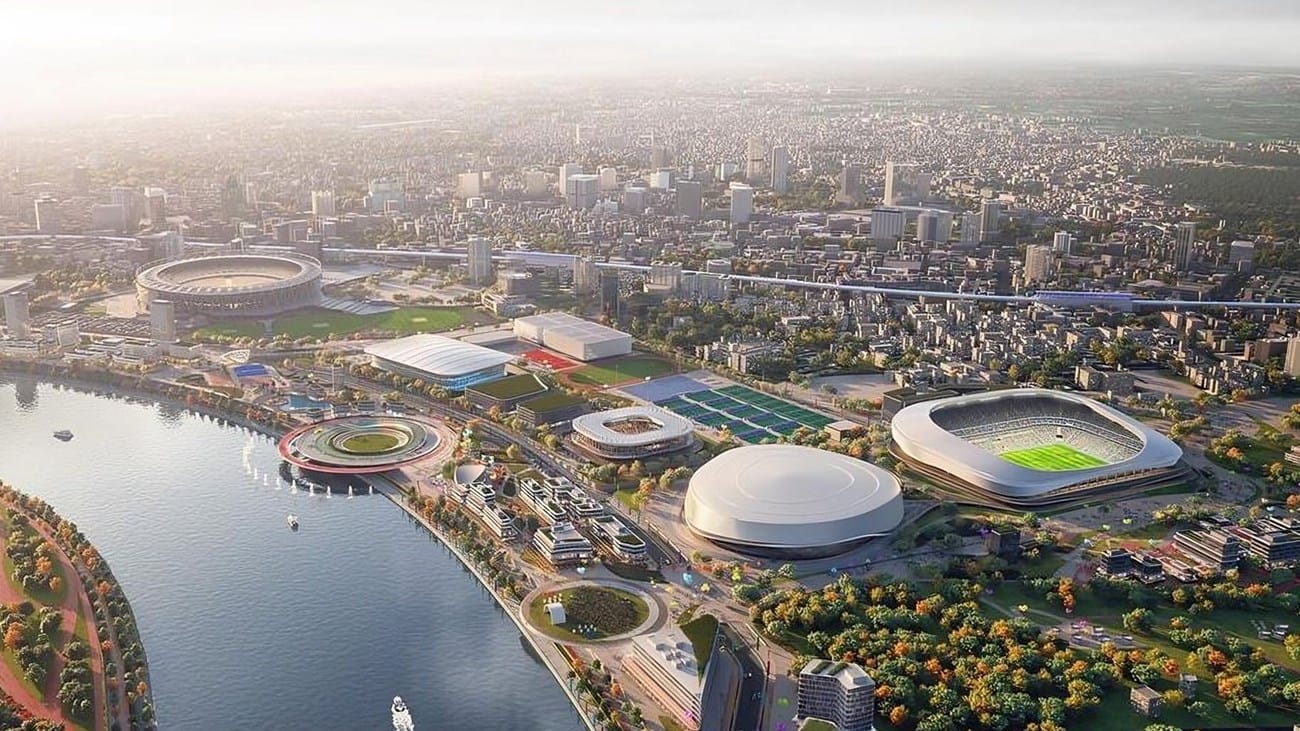The Bidding Brink: India vs. Nigeria for the 2030 Commonwealth Games
The race to host the 2030 Commonwealth Games has intensified as India and Nigeria formally submitted their bids by the August 31 deadline.

Written by Lavanya, Intern, Allegedly The News
NEW DELHI, September 3, 2025
The 2030 Commonwealth Games, the centenary edition of a sporting event steeped in history, has become a high-stakes two-horse race. With the deadline for formal proposals now past, the Commonwealth Sport (CS), the event's governing body, has confirmed it has received official bids from only two nations: India and Nigeria. This development has set the stage for a fascinating and unpredictable contest, pitting India's established power and a well-structured bid against Nigeria's historic ambition and the Commonwealth's desire for a new direction. The future of the Commonwealth Games hangs in the balance, with the choice between these two nations potentially defining the event for decades to come.
The Contestants: A Tale of Two Bids
India's bid, centered on the city of Ahmedabad, is a testament to the nation's growing economic and sporting prowess. The proposal has the full backing of the Indian government, with the Union Cabinet formally approving the bid on August 27, 2025. This governmental endorsement is a crucial component, as it includes the necessary financial guarantees and a commitment to sign the Host Collaboration Agreement. The choice of Ahmedabad is strategic, highlighting the city's modern infrastructure and its potential to be a "sports hub." The bid leverages the city's existing facilities, most notably the Narendra Modi Stadium, the world's largest cricket stadium, which has already proven its capacity by successfully hosting the 2023 ICC Cricket World Cup final. This readymade infrastructure is a significant strength, addressing one of the primary concerns that has plagued recent Games hosts: escalating costs. India's proposal also aligns with the CS's "Games Reset" principles, emphasizing sustainability, inclusivity, and a lasting legacy.
Nigeria's bid, though less publicized in its specifics, represents a bold and symbolic move. The nation's Olympic Committee submitted an expression of interest earlier in the year, and a formal proposal for the capital city, Abuja, has now been lodged. While Nigeria may not have the same level of developed infrastructure as India, its bid is significant for several reasons. It marks the first time an African nation has formally bid for the Games since Durban, South Africa, had its hosting rights for the 2022 Games revoked due to financial issues. If successful, Nigeria would be the first African nation to host the Games, a historic milestone that would send a powerful message about the Commonwealth's commitment to its African members. Nigeria's bid is a narrative of opportunity, a chance for the Games to drive development and inspire a continent.
An Unprecedented Bidding Landscape: The CGF's 'Games Reset'
The context for this bidding race is critical. The Commonwealth Games Federation (CGF) has been in a state of crisis following the withdrawal of several hosts. The Australian state of Victoria pulled out of hosting the 2026 Games, citing a massive cost blowout. This, along with Durban's earlier withdrawal, forced the CGF to initiate a "Games Reset" strategy. This new approach moves away from a traditional, expensive bidding process and encourages a more flexible and collaborative model. The focus is on sustainability, the use of existing venues, and a reduced financial burden on host cities. This new philosophy levels the playing field, making a less-resourced nation like Nigeria a viable contender.
For India, this new model is both an opportunity and a challenge. On one hand, its bid in Ahmedabad, with its established infrastructure and strong financial backing, is a "safe" and reliable choice that aligns with the CGF's desire for stability. On the other hand, the CGF is looking for a host that can bring renewed relevance and enthusiasm to the Games. Nigeria's bid for Abuja presents a compelling "new frontier" argument, tapping into the idea of a legacy that extends beyond just sports infrastructure and into broader economic and social development across a crucial region of the Commonwealth.
The Strengths and Weaknesses: A Side-by-Side Analysis
The two bids present a fascinating contrast in their strengths and weaknesses.
India's Bid: The Power of Proven Capability
- Strengths:
- Existing Infrastructure: Ahmedabad is ready to host. The city's existing stadiums, including the world-class Narendra Modi Stadium, and its well-developed transport networks, provide a solid foundation. This significantly reduces the need for new, costly construction.
- Economic Stability: India, as a rapidly growing economic power, can provide the necessary financial guarantees and absorb the significant costs associated with a mega-event.
- Government Backing: The official approval from the Union Cabinet demonstrates a clear, unified commitment at the highest level of government, a critical factor for securing a bid.
- Experience: India has hosted the Games before (New Delhi, 2010), giving it invaluable experience in event management, logistics, and security.
- Weaknesses:
- Past Controversies: The 2010 Delhi Games, while a sporting success, were marred by allegations of corruption and mismanagement. This history could be a point of concern for some voters, despite India's promises of a more transparent process.
- A Familiar Narrative: For some, another Games in a major Asian economy might not be as compelling as a new host. The "Games Reset" is designed to diversify the hosts, and a vote for India could be seen as a return to the old model.

Nigeria's Bid: The Allure of a New Frontier
- Strengths:
- Historic Opportunity: A successful bid would make Nigeria the first African host of the Games, a powerful and symbolic achievement that would resonate across the continent and the Commonwealth.
- Symbol of the 'Games Reset': Nigeria's bid embodies the new vision of the CGF. It’s a chance to show that the Games are not just for wealthy nations but can be a tool for development and inspiration in emerging economies.
- Strong Voting Bloc: Nigeria can likely count on strong support from the African Commonwealth nations, which collectively represent a significant voting bloc.
- Weaknesses:
- Infrastructure Gaps: Nigeria currently lacks the world-class, multi-sport facilities necessary to host the Games. Significant investment would be required, and questions remain about the country's capacity to deliver this infrastructure on time.
- Financial Challenges: Unlike India, Nigeria's economy is not as robust, and the government's ability to provide the large-scale financial guarantees required for a mega-event could be a major hurdle.
- Uncertainty: A game in Nigeria would be a gamble for the CGF. The lack of a proven track record for hosting events of this scale could make member nations hesitant.
The Final Stretch: Political Alliances and Voting Dynamics
The decision on the host city is not just about proposals and financial guarantees; it's a deeply political process. The final vote will take place at the CGF General Assembly in Glasgow in late November. The 74 member nations and territories will cast their votes, and the result will be decided by a simple majority.
India's strategy will likely involve leveraging its strong diplomatic ties with Commonwealth nations in Asia, the Pacific, and the Caribbean. India is a key partner for many smaller nations, providing economic aid and development support. This goodwill could translate into votes.
Nigeria's bid, meanwhile, will seek to unite the African bloc. There is a strong sense of continental pride and a desire to see Africa represented on the global sporting stage. Nigeria will argue that the Games are an opportunity to invest in a region that has often been overlooked. With Africa making up a substantial portion of the Commonwealth, a unified African voting bloc could swing the decision in Nigeria's favor.
The outcome could also depend on how the CGF's new leadership interprets the "Games Reset." Are they ready to take a risk on a new host to demonstrate the flexibility of the new model, or will they opt for the reliability and financial security that India provides?
The Grand Finale: A Decision with Global Implications
The bid process for the 2030 Commonwealth Games has evolved from a simple formality into a genuine competition. The shocking entry of Nigeria into the race has injected a new layer of intrigue and significance into the decision. This is no longer just a choice between two cities; it is a choice between two visions for the future of the Commonwealth Games. Will the CGF continue to rely on established hosts, or will it embrace the opportunity to create a new legacy in Africa? The answer will not only determine the fate of the 2030 Games but could also reshape the dynamics of international sports hosting for years to come.
The Legacy Question: What's at Stake?
For India, hosting the 2030 Games would be a crucial stepping stone in its larger ambition to bid for the 2036 Olympic Games. Successfully hosting a major multi-sport event would demonstrate India's organizational capability, infrastructure, and growing sporting culture to the world. It would generate significant soft power, cementing its status as a major global player. The economic benefits, including job creation and tourism, would be immense.
For Nigeria, the victory would be transformational. It would be a source of national pride and a powerful statement of intent. Hosting the Games could be a catalyst for much-needed infrastructure development, not just in sports but in transport and hospitality. It would inspire a new generation of athletes and demonstrate the potential of the African continent to a global audience.
Final Thoughts & Open Questions
The final decision by the Commonwealth Sport Federation will be a defining moment. It will reveal whether the organization is truly committed to its new "Games Reset" philosophy of inclusivity and sustainability or if it will fall back on the security of a well-resourced, established host. While India's bid is robust and compelling, the symbolic power and long-term potential of a Nigerian-hosted Games are impossible to ignore. The battle for 2030 is set to be one of the most interesting in the history of the Commonwealth Games.
Questions to Consider
- The Unspoken Tiebreaker: What would it take for Nigeria to convince the voting members that it can overcome its infrastructure and financial hurdles?
- The Long View: Could a successful Nigerian bid, if it proves to be a model of a low-cost, high-impact Games, fundamentally alter the future of multi-sport events globally?
Sources
PTI News, The Times of India, The Hindu, Commonwealth Sport.




